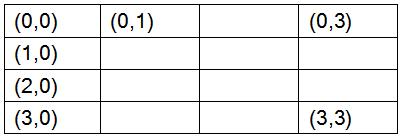hud 4740 The Donkey of Gui Zhou(深搜DFS)
来源:互联网 发布:陈一发 整容 知乎 编辑:程序博客网 时间:2024/05/16 17:11
The Donkey of Gui Zhou
Time Limit:1000MS Memory Limit:32768KB 64bit IO Format:%I64d & %I64u
Description
There was no donkey in the province of Gui Zhou, China. A trouble maker shipped
one and put it in the forest which could be considered as an N×N grid. The coordinates
of the up-left cell is (0,0) , the down-right cell is(N-1,N-1) and he cell below the up-left
cell is (1,0)..... A 4×4 grid is shown below:

The donkey lived happily until it saw a tiger far away. The donkey had never seen
a tiger ,and the tiger had never seen a donkey. Both of them were frightened and wanted
to escape from each other. So they started running fast. Because they were scared, they
were running in a way that didn't make any sense. Each step they moved to the next cell
in their running direction, but they couldn't get out of the forest. And because they both
wanted to go to new places, the donkey would never stepped into a cell which had already
been visited by itself, and the tiger acted the same way. Both the donkey and the tiger ran
in a random direction at the beginning and they always had the same speed. They would
not change their directions until they couldn't run straight ahead any more. If they couldn't
go ahead any more ,they changed their directions immediately. When changing direction,
the donkey always turned right and the tiger always turned left. If they made a turn and still
couldn't go ahead, they would stop running and stayed where they were, without trying to
make another turn. Now given their starting positions and directions, please count whether
they would meet in a cell.
Input
There are several test cases.
In each test case:
First line is an integer N, meaning that the forest is a N×N grid.
The second line contains three integers R, C and D, meaning that the donkey is in the
cell (R,C) when they started running, and it's original direction is D. D can be 0, 1, 2 or
3. 0 means east, 1 means south , 2 means west,and 3 means north.
The third line has the same format and meaning as the second line, but it is for the tiger.
The input ends with N = 0. ( 2 <= N <= 1000, 0 <= R, C < N)
Output
For each test case, if the donkey and the tiger would meet in a cell, print the coordinate
of the cell where they meet first time. If they would never meet, print -1 instead.
Sample Input
20 0 00 1 2040 13 2 00
Sample Output
-11 3
题意:有一个N*N的方格,a donkey和a tiger分别在一个小格子里面,donkey只能往前或
往右走,tiger只能往前或 往左走。同样地,当不能转弯时,就停下来。他们没走一格,
所花的时间一样。输出他们第一次相遇的地点,即格子的坐标。
代码:
#include <cstdio>
#include <cstring>
using namespace std;
#include <cstring>
using namespace std;
#define MAXN 1005
int dir[4][2]= {{0,1},{1,0},{0,-1},{-1,0}};//东南西北
int n,p,q;
int donkey[MAXN][MAXN],tiger[MAXN][MAXN];
void DFS(int a,int b,int c,int x,int y,int z)
{
donkey[a][b]=1;
tiger[x][y]=1;
if(a==x&&b==y)
{
printf("%d %d\n",a,b);
return ;
}
if(p&&q)
{
printf("-1\n");
return ;
}
int aa,bb,xx,yy;
if(p)
{
aa=a;
bb=b;
}
else
{
aa=a+dir[c][0];
bb=b+dir[c][1];
if(aa<0||bb<0||aa>=n||bb>=n||donkey[aa][bb]==1)
{
c=(c+1)%4;//向右
aa=a+dir[c][0];
bb=b+dir[c][1];
if(aa<0||bb<0||aa>=n||bb>=n||donkey[aa][bb]==1)
{
p=1;
aa=a;
bb=b;
}
}
}
if(q)
{
xx=x;
yy=y;
}
else
{
xx=x+dir[z][0];
yy=y+dir[z][1];
if(xx<0||yy<0||xx>=n||yy>=n||tiger[xx][yy]==1)
{
z=(z-1+4)%4;//向左
xx=x+dir[z][0];
yy=y+dir[z][1];
if(xx<0||yy<0||xx>=n||yy>=n||tiger[xx][yy]==1)
{
q=1;
xx=x;
yy=y;
}
}
}
DFS(aa,bb,c,xx,yy,z);
}
int main()
{
int a,b,c,x,y,z;
while(scanf("%d",&n),n)
{
scanf("%d%d%d",&a,&b,&c);
scanf("%d%d%d",&x,&y,&z);
if(a==x&&b==y)
{
printf("%d %d\n",a,b);
continue;
}
else
{
memset(donkey,0,sizeof(donkey));
memset(tiger,0,sizeof(tiger));
p=q=0;
DFS(a,b,c,x,y,z);
}
}
return 0;
}
0 0
- hud 4740 The Donkey of Gui Zhou(深搜DFS)
- hdu 4740 The Donkey of Gui Zhou
- hdu 4740 The Donkey of Gui Zhou
- Hdu 4740 The Donkey of Gui Zhou
- hdu 4740 The Donkey of Gui Zhou
- HDU 4740 The Donkey of Gui Zhou
- HDU 4740 The Donkey of Gui Zhou
- HDU 4740 The Donkey of Gui Zhou(模拟)
- hdu4740The Donkey of Gui Zhou dfs水题
- hdu 4740 The Donkey of Gui Zhou dfs 搜索 解题报告
- HDU 4740 The Donkey of Gui Zhou (模拟)
- hdu 4740—€—The Donkey of Gui Zhou
- HDOJ 4740 - The Donkey of Gui Zhou 模拟
- HDU 4740——The Donkey of Gui Zhou
- HDU 4740 The Donkey of Gui Zhou 暴力
- 【hdu】The Donkey of Gui Zhou(搜索)
- hdu 4740 The Donkey of Gui Zhou 深搜(2013 ACM/ICPC Asia Regional Hangzhou Online 1003)
- HDU4740 The Donkey of Gui Zhou 暴力模拟
- #pragma init_seg使特定的全局变量优先于其他的全局变量先构造
- asp.net 退出登陆(解决退出后点击浏览器后退问题仍然可回到页面问题)
- 有了Docker,一分钟就可以在你的笔记本上快速部署Spark集群
- Windows 运行机制
- poj1067
- hud 4740 The Donkey of Gui Zhou(深搜DFS)
- JMS的例子
- hdu 1257 最少拦截系统
- Solaris下如何修改文件创建时间及查询
- 网络爬虫教程(1)
- Chapter5 Relational Algebra and Relational Calculus
- Java实现二叉树的遍历
- 线段树---no end
- Redis配置文件大全


